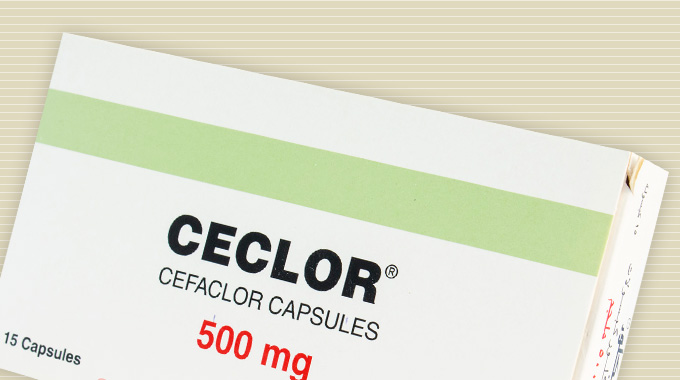Ceclor (cefaclor)
Ceclor belongs to the group of medicine known as cephalosporin antibiotics. This medication helps in fighting against bacteria in the body. Ceclor is used for treating various types of bacterial infections. They may also be used for other purposes that are not mentioned to this medication guide. Ceclor should not be taken if the person is allergic to cefaclor, or other similar antibiotics, like Keflex, Ceftin, Omnicef, Cefzil etc. before the use of this medication, the doctor should be informed about any allergies the person has towards any drugs (like penicillin).

Dosage
The dosage of Ceclor (cefaclor) can vary depending on the specific infection being treated, the severity of the condition, and individual factors such as age and weight. It is important to follow the instructions provided by your healthcare professional or the prescribing information on the medication label. The following are general dosage guidelines for adults:
Respiratory Tract Infections:
- Mild to moderate infections: 250 mg (one Ceclor capsule) taken three times daily.
- Severe infections: 500 mg (two Ceclor capsules) taken three times daily.
Ear Infections:
- Mild to moderate infections: 250 mg (one Ceclor capsule) taken three times daily.
- Severe infections: 500 mg (two Ceclor capsules) taken three times daily.
Urinary Tract Infections:
- Uncomplicated infections: 250 mg (one Ceclor capsule) taken three times daily.
- Complicated or more severe infections: 500 mg (two Ceclor capsules) taken three times daily.
Composition
Ceclor, also called Cefaclor is a cephalosporin antibiotic. It is a semisynthetic drug used for oral administration. The inactive ingredients in a 250 mg pulvule are:
- Silicone
- Gelatin
- Magnesium stearate
- Titanium dioxide
- FD&C Red No. 40
- Cornstarch
A 500 mg pulvule contains iron oxide in addition to the above ingredients.
Uses
This cephalosporin-type antibiotic is used for the treatment of a large variety of infections that are caused by bacteria (such as skin, middle ear, respiratory tract, and urine infections). It helps the treatment by preventing the growth of bacteria.
This medication can only help in case of bacterial infections. They do not help in curing viral infections (like flu and common cold). Misuse and the unnecessary usage of this drug can eventually reduce its effectiveness.
Side-effects
There are many side-effects associated with the use of ceclor which may require medical attention. If can the person experiences any of these allergic reactions, he/she should be given emergency medical help:
- Swelling in face
- Breathing difficulty
Some serious side-effects are mentioned below:
- Bloody or watery diarrhoea
- Easy bleeding or bruising, muscle weakness, severe numbness, pain tingling
- Seizures (convulsions)
- bleeding
- Yellowed skin
- confusion
- Dark coloured urine
- Fever
- Jaundice
- Body aches,
- flu symptoms,
- itching,
- joint pain,
- Sore throat, headache
- Severe peeling,
- Loss of appetite
- Increased thirst
- Breathlessness
- Reduced amount of urination
- Weight gain
- Stomach pain,
- vomiting,
- stiff muscles
- Feeling hyperactive or restless
- Unpleasant taste in the mouth’
- Skin rash
- Drowsiness
- Vaginal discharge

Contraindications
There are conditions when the person should not be allowed to take this medication. They are mentioned as follows:
- Allergic reaction to cephalosporins betalactams
- Clostridium Difficile Bacteria Related Colitis
Ceclor and pregnancy
According to animal studies, there are no found evidences of fetal harm during pregnancy. Though there isn’t any controlled data collected for human pregnancy. Therefore, ceclor should only be used when the benefits outweigh the risks.
Some frequently asked questions about Cefaclor
What is Cefaclor?
Cefaclor is an antibiotic medication that belongs to the cephalosporin class. It is commonly prescribed to treat various bacterial infections, including respiratory tract infections, ear infections, urinary tract infections, and skin infections.
How does Cefaclor work?
Cefaclor works by interfering with the formation of the bacterial cell wall. It targets and inhibits the growth of bacteria, preventing them from multiplying and causing further infection.
What types of infections are treated with Cefaclor?
Cefaclor is commonly used to treat respiratory tract infections such as bronchitis, sinusitis, and pneumonia. It is also effective against ear infections, urinary tract infections, and skin and soft tissue infections caused by susceptible bacteria.
What is the usual dosage of Cefaclor?
The dosage of Cefaclor can vary depending on the type and severity of the infection. For most infections, the usual adult dosage ranges from 250 mg to 500 mg taken three times daily. However, it is important to follow the specific dosage instructions provided by your healthcare professional.
What are the common side effects of Cefaclor?
Common side effects of Cefaclor may include diarrhea, nausea, vomiting, stomach pain, and rash. It is important to be aware of any potential allergic reactions or more serious side effects such as severe skin reactions or difficulty breathing, and to seek medical attention if you experience any concerning symptoms.
Can Cefaclor interact with other medications?
Cefaclor may interact with certain medications, including probenecid, which can increase the levels of Cefaclor in the body. It is important to inform your healthcare professional about all the medications you are taking to avoid potential interactions.
Can anyone take Cefaclor?
Cefaclor may not be suitable for everyone. It is important to inform your healthcare professional about your complete medical history, including any allergies, kidney problems, or a history of gastrointestinal diseases. They will determine if Cefaclor is appropriate for you and adjust the dosage if needed.
- Download in PDF » Ceclor: Product Information


